MARKET OVERVIEW
Europe Digestive Enzymes market holds a significant share in the health and wellness market because its consumers are increasingly getting interested in their digestive health. Digestive enzymes make the break-down of food more efficient, thereby allowing the human body to absorb nutrients better. In Europe, awareness concerning digestive health is expected to keep building steam due to higher cases of digestive conditions and diets. The marketplace consists of a variety of enzyme supplements, such as amylases, lipases, and proteases, specifically meant to assist in the digestive process by individuals who have some form of enzyme deficiency or digestive health disorder.
The European market for digestive enzyme products will continue to gain momentum as Europe continues to strive for better health and quality of life. Probably, the focus of health care in this region would be prevention health measures with digestive well-being supplements as an integral part of health promotion. Probably, consumer preferences in Europe for natural and efficient solutions to health problems will drive the development of the Europe Digestive Enzymes market.
There are many factors that are going to shape the Europe Digestive Enzymes market in the forthcoming years. Of late, interest among consumers to opt for plant-based and natural enzyme supplements is likely to take the market forward. Going forward, the growing acceptance of plant-based lifestyles in Europe is likely to stimulate manufacturers’ demand to produce more enzyme supplements from natural and vegan sources. This trend will definitely be in-line with the preferences of an environmentally conscious consumer, and companies will have to set its product lines to address this fast-changing consumer preference.
This trend will be so impactful that it will shape how regulation is designed for the future of Europe Digestive Enzymes. Regulation related to food and supplement safety is far more stringent in the European Union region, and companies doing business with this region must have their products be compliant to these standards as well. The pressure of clean labeling and transparency is likely to remain at the helm of the scenario, influencing how enzyme supplements are formulated, marketed, and consumed. For this reason, the manufacturers need to ensure their products contain no artificial additives and allergens, while full information regarding the source of the ingredients and manufacturing process shall be provided.
This effect will be seen in the development and marketing of digestive enzymes products to consumers with technological advancement. New formulations will emerge due to developments in enzyme science with increased efficiency and specificity toward most digestive disorders. Europe Digestive Enzymes market participants will be compelled to invest in research and development along with advanced targeted enzyme products and solutions that suit the diverse needs of the population.
The competitive landscape will change in Europe Digestive Enzymes, with old players in the pharmaceutical space plus newer entrants in this space. Brand differentiation will have to emerge prominently because more products are flooding the market. The marketer will need to make use of marketing that has a touch of clinical efficacy, sustainability, and superior ingredients as means of attracting and holding on to customers.
The overall scenario in the Europe Digestive Enzymes market reflects transformation, by virtue of consumer demand for better digestive health, innovation in natural products, and influence of regulatory standards. Companies that stay agile and respond to the market would gain by capitalizing on the great opportunities arising out of this dynamic sector.
Europe Digestive Enzymes market is estimated to reach $370.5 Million by 2031; growing at a CAGR of 6.4% from 2024 to 2031.
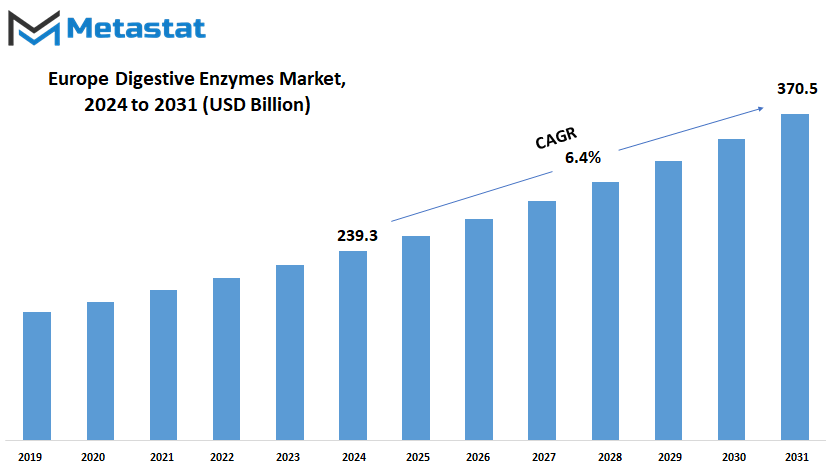
GROWTH FACTORS
The Europe Digestive Enzymes market is expected to be stable for growth in the years to come ahead due to a number of driving factors. The primary reason for such growth can be attributed to increased awareness of consumer digestive health. As people become more conscious about their well-being, they seek supplements to support digestion, particularly those suffering from conditions like indigestion or bloating. The digestive enzymes are used widely to complement the digestion system of the body, apparently amplifying the progress toward better nutrition intake, especially in breaking down ingested food. Also, the aging population of Europe is another contributor because most older persons experience reduced production of digestive enzymes compared with other living human bodies.
Such unhealthy eating habits and consumption of processed food have emerged to be one of the major causes of rising digestive problems in all age groups during recent times. It has consequently increased use of digestive enzyme supplements for not tolerating discomfort at such times. This too will be followed with successive years and propel the market forward. Additionally, researches and science behind enzymes keep on changing with time. So are the technologies for preparing them. Therefore, these supplements are emerging to be more effective and accessible without much hassle, thereby promoting the demand and usage of such supplements.
There are also some challenges that could lead to slowdown in the growth of the Europe Digestive Enzymes market. In the region, stringent laws on health supplements may slow the introduction of new and innovative products because of strict European Union guidelines for the approval of products. The high cost of digestive enzyme supplements may also demotivate some consumers, especially price-sensitive markets. These could bring the markets to a standstill.
However, there are more opportunities that would make profits quite attractive. The future of larger demand from the increasing ability of people wanting to adopt healthier lifestyles and awareness created about the digestion enzyme benefits will occur. Then, further research and product innovation will probably make companies come up with a more efficient and effective enzyme supplement at a lower price. This will increase market competitiveness as well as ease of access to the consumers, which leads to more growth. Thus, the future of the Europe Digestive Enzymes market looks promising regarding its trend and it can be highly likely to happen in the coming years.
MARKET SEGMENTATION
By Source
The market for digestive enzymes further can be classified on the basis of source into animal, microbial, plant, and others. Each source will have a different nature, hence has different purposes due to the varying needs and preferences of people. For instance, animal-based enzymes have high enzymatic activity in the hydrolysis of proteins, fats, and carbohydrates. This might be the preference for individuals who want general support during digestion. However, with the growing awareness in animal and dietary ethics, plant-based and microbial enzymes are trending. Such an enzyme can be obtained from a plant and is seen by many as naturally conceived, appealing thus to vegetarians or vegans in this respect. Finally, plant-derived enzymes are thought of as gentler for the system, appealing thus to those with sensitive digestive systems.
Another fast-growing segment in Europe Digestive Enzymes market is microbial enzymes from bacteria and fungi. Overall, these have better stability and can be used across a broader pH range than mammalian digestive enzymes; therefore, such products can go into more varied product lines. As microbiome research continues to advance, there exists scope for innovation going forward in future microbial enzyme supplements for more effective management of targeted digestive health issues.
Future for Europe Digestive Enzymes would hold a promise of more opportunities as demand for tailor-made health treatments from consumers keeps rising. Biotechnology will only get better, and new sources of digestive support will emerge in the form of customized enzymes to better suit different diets and needs in health. Plant-based and microbial enzymes may gain increasing popularity with the continually rising sustainability and health care awareness in most parts of the world. This change in relation with technological advancement will continue to promote the trend for digestive enzymes in Europe and makes the market dynamic and responsive to changing preferences of consumers.
By Form
The Europe Digestive Enzymes market continues growing steadily due to increased awareness over digestive health and the increasing prevalence of digestive disorders. Product forms in the Europe Digestive Enzymes market are of the kind: liquid, capsule, tablets, powder, and gummies. Each form is for meeting each consumer's preference and need. Liquid forms are mostly preferred for easy use, for they are faster in their absorption into the body. This is why many people appreciate liquid forms of supplementation as they may be taken with drinks or directly ingested without swallowing pills. Especially appealing to those who find it difficult to swallow a capsule or tablet, the elderly, and the young.
Capsules and tablets are the most popular presentations in the Europe Digestive Enzymes market. Such dosage forms are easy and comfortable to take, and most of them have measured doses that help the consumer know exactly what is taken. Particularly, capsules happen to dissolve primarily in the stomach, releasing their active ingredients in a targeted manner. Tablets are generally more stable on shelf for a longer period, making them all the more practical for the long term.
Powdered digestive enzymes are also becoming popular among advocates who prefer to incorporate their supplements into their foods or beverages. The powder is easily adjusted to suit an individual's dosing requirements. For example, athletes or sports-minded enthusiasts might prefer a liquid preparation in a powdered consistency that may be added to protein supplement shakes or other nutritional beverages.
Gummies are a new, fun, and tasty alternative, especially for younger consumers or those who dislike or abhor traditional pills. They blend the familiarity of digestive enzyme benefits with the fun of a treat to make it easier to add supplements into daily life.
The Europe Digestive Enzymes market will grow in the future because consumers are increasingly demanding more individualized and convenient preparation forms of these types of dietary supplements. There are numerous forms available to help ensure that everyone can select a form that is best for lifestyle and need.
By Application
The market, broken down by application, ranges in categories to include gluten intolerance, gas and bloating, lactose intolerance, constipation, and many others. Each category reflects a different challenge that people face concerning digestive health, hence is driving the need for specific enzyme formulations. For instance, while lactose intolerance will result in individuals turning to lactase enzymes to digest dairy products without discomfort, others suffering gluten intolerance may use certain enzymes to better tolerate gluten in their diet. Such segmentation can be customized and offers solutions directly to the needs of consumers. Therefore, the market will expand as more advanced enzyme supplements are developed with the intent of meeting changing consumer health needs. Demand will thus rise on the part of enzyme supplements that concentrate on gluten intolerance and lactose intolerance as the diagnoses on these areas increase. As more consumers look for a natural and effective remedy to manage their digestive health, demand for products that alleviate general discomforts including gas and bloating is expected to rise.
Yet another future growth area in this industry is the growing incorporation of digestive enzymes into day-to-day health practices-be it to prevent or treat. With the increasing awareness of healthy lifestyle choices, consumers are becoming more proactive in their health and might just start taking enzymes as part of the multitude of measures to keep their gut and their body healthy.
Europe digestive enzymes market will benefit from growth as awareness regarding digestive issues is increased and with new, more potent enzyme formulations that emerge. Segmentation on the basis of application allows for specialized products that could serve a variety of needs, ranging from very specific intolerances to more general digestive concerns.
By Enzyme
The demand for digestive enzymes is expected to increase significantly in the coming years and would primarily be influenced by digestive health awareness. Since the concern for health has been rising, people have become increasingly conscious about their digestive health and now increasingly identify that digestive enzymes are crucial to support all other factors of health. These digestive enzymes split food into simpler forms to ensure better absorption and are, therefore, now an essential concern for consumers as well as healthcare professionals.
The market can be segmented into various types of enzymes, which include Carbohydrase, Protease, Lipase, and others. Carbohydrase breaks down carbohydrates, thereby facilitating easy digestion. This enzyme is hence very helpful for people who face difficulties in digesting starch and sugar-rich food items. As more and more people are opting for high-carbohydrate diets, there is an upward trend regarding demand for Carbohydrase.
Another crucial enzyme is that of protease, which breaks down proteins into amino acids to further assist in protein digestion. As people become more interested in diets with high levels of proteins-for working out or just health-conscious-this demand in the market for Protease enzymes will probably increase. More so, as people try to regain their muscles and ingest more proteins, the role that Protease plays will prove crucially instrumental in the digestion processes.
However, in the case of Lipase, it also works on breaking down fats. With the raising intake of fats, especially with diets like ketogenic or high-fat diets, the importance of Lipase lies in seeing to it that an amount of nutrients is digested and thereby absorbable for assimilation into the blood. Hence, the demand is expected to rise with the heightening of awareness of the intake of fats and importance of digesting it properly.
In addition to these three major enzymes, there are several others being researched and developed in order to cater to specific digestive needs. Some will further break down lactose or attack unique digestive disorders. This list will expand as science develops and continues to dissect digestive enzymes.
The interest in digestive health and personalized nutrition will continue to drive the Europe Digestive Enzymes market forward in the near future. Consumers have become better educated about how various enzymes work, hence demand solutions tailored to their specific dietary habits and health goals. This would push innovation within the production and formulation of digestive enzymes and would make them a vitally important part of modern healthcare in Europe.
|
Report Coverage |
Details |
|
Forecast Period |
2024-2031 |
|
Market Size in 2024 |
$239.3 million |
|
Market Size by 2031 |
$370.5 Million |
|
Growth Rate from 2024 to 2031 |
6.4% |
|
Base Year |
2022 |
|
Regions Covered |
Germany, France, United Kingdom, Italy, Rest of Europe |
REGIONAL ANALYSIS
The digestive enzymes market in Europe is poised to experience impressive growth over the next couple of years, along with the growing awareness of digestive health and the demand for dietary supplements in the region. More people in the region are gaining a better understanding of how proper digestion is important for health, thus why people are in greater interest with digestive enzyme products. These digestive enzymes help to break down food, enable the absorption of nutrients, and assist in better digestion overall. More people becoming health-conscious may increase the demand for digestive enzymes as part of an everyday health routine.
Growing in Europe: Drivers in the market Factors driving growth are ageing population and increase in gastrointestinal disorders. As the population continues to age, problems with indigestion, bloating, and other digestive complaints are becoming increasingly common. The demand for digestive enzymes fueled by such disorders will be backed by this demography profile. Finally, increasing occurrence of digestive disorders fuels the market. Many continue to seek natural solutions in pursuit of better digestive health, and enzyme supplements have been provided as a resource that is attainable and non-intrusive.
Western Europe is likely to maintain its market dominance in terms of distribution, mainly due to a healthy level of awareness, sufficient purchasing powers, and well-developed healthcare infrastructure. Countries like Germany, France, and the UK are likely to continue being key contributors to market growth. These countries have a strong demand for health supplements, and digestive enzymes are gaining popularity. Eastern Europe should also be stabilized increasingly within the market share, with increasing acknowledgment of digestive health. Although this region is now still smaller than Western Europe in terms of market size, growing interest in preventive healthcare and nutrition may open future avenues for development.
In the future, the market is expected to be highly innovative regarding new product formulations and combinations being developed to meet specific needs related to digestive health. It may reach down to some specific tailored enzymes for specific intolerances, such as lactose or gluten. As the research unfolds in this area, more customized enzyme supplements will arrive that cater to a healthier need of individual physiology. On a broader perspective, the Europe digestive enzymes market seems very promising in the future because of increased health awareness, which these days is getting healthier and paying greater attention to digestive wellbeing all over the region.
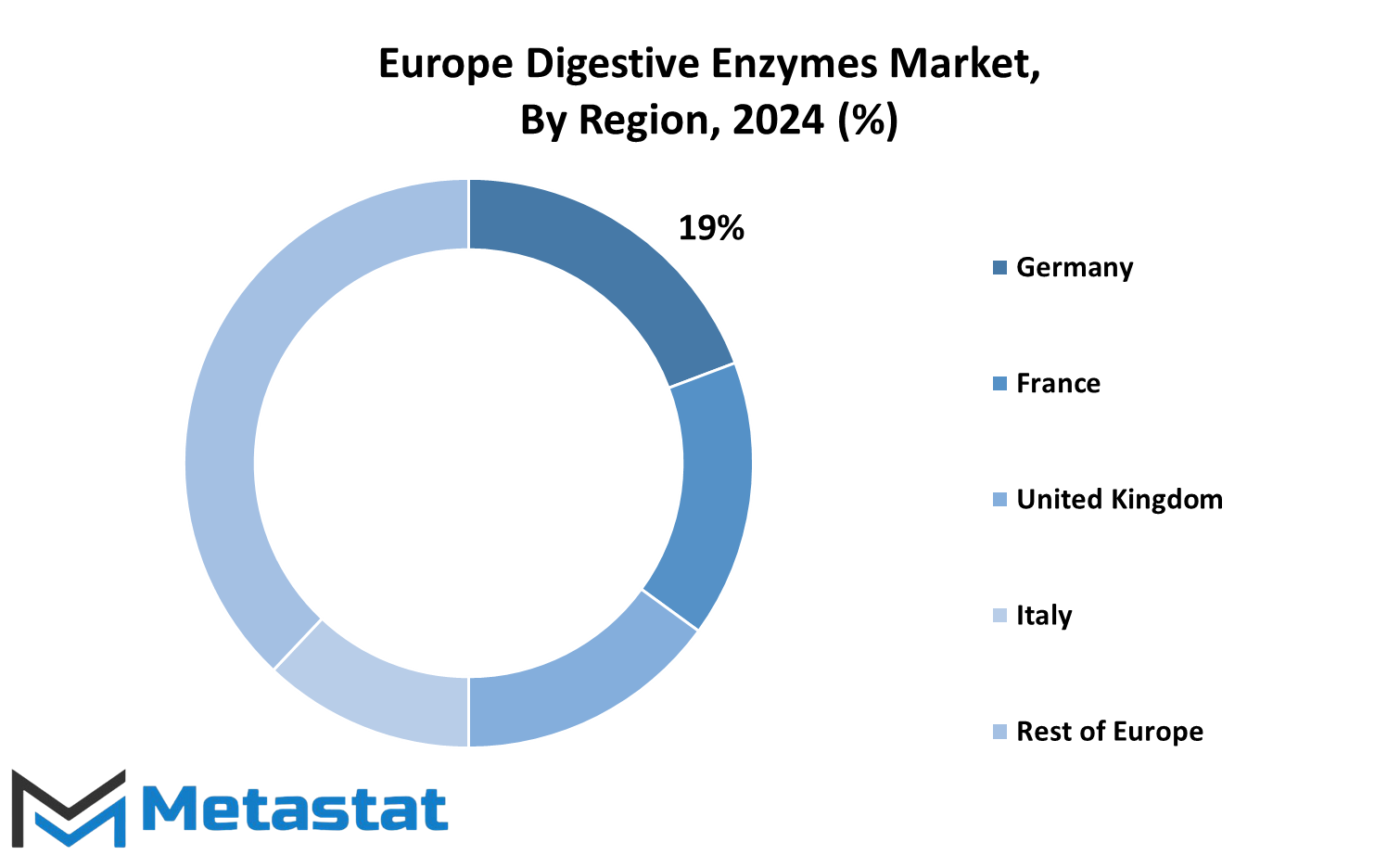
COMPETITIVE PLAYERS
The Europe Digestive Enzymes market will be witnessing significant growth over the next few years mainly due to increased awareness among consumers about digestive health and the ever-increasing incidence of gastrointestinal diseases. Rising awareness in Europe among people about the health benefits of digestive enzymes will also increase demand for supplements and products which help in digestion. These digestive enzymes, catalyzed to break up foods into nutrients, play the most important roles in overall well-being. Its use is not only to treat digestive issues but also as a means of general health maintenance.
Major operators operating in the Europe Digestive Enzymes market already include Yango Sp. z o.o., Nestlé Health Science, Amway Corporation, Houston Nutraceuticals, Inc., Enzymedica, Inc., Integrative Therapeutics, SFI (Klaire Labs), Twinlab Consolidation Corporation, NOW Foods, DSM Nutritional Products AG, Vitabiotics, Swanson Health Products Europe, Thorne, and Jarrow Formulas, Inc. Companies like these are the first innovators of new products responding to more specific conditions and general wellness trend. While the competition increases, such companies are going to expand their product portfolios for more customized needs for health and have better distribution throughout the region.
Advancements in research is going to be a big contributor in shaping the Europe Digestive Enzymes market. Further new studies and developments in nutrition, in addition to advancements in enzyme effectiveness, will lead to more sophisticated formulations in the future. With consumers demanding products that do not only enhance digestion but also further health benefits to the metabolism and immune system, manufacturers might start producing more multifunctional enzyme blends. This could lead to market segmentation, where a company directly targets niche consumer segments with the appropriate product offerings.
Furthermore, technological advancements are more than likely to improve the efficacy and strength of digestive enzyme supplements. Improvements in biotechnology will give manufacturers more ways to manufacture enzymes that mimic the dynamics of natural digestion, not just for human consumers, but also to allow commercial development of prescription-grade digestive enzymes-a potential giant sector in that market.
Increasing consumer demand will drive the Europe Digestive Enzymes market, and significant companies will evolve their strategies to satisfy both current and future consumer needs. Companies well positioned in this competitive environment are the ones which will stay ahead of the curve through achieving scientific and technology advancement as well as consumer preferences.
Europe Digestive Enzymes Market Key Segments:
By Source
- Animal
- Microbial
- Plant
- Others
By Form
- Liquid
- Capsule
- Tablets
- Powder
- Gummies
By Application
- Gluten Intolerance
- Gas/Bloating
- Lactose Intolerance
- Constipation
- Others
By Enzyme
- Carbohydrase
- Protease
- Lipase
- Others
Key Europe Digestive Enzymes Industry Players
- Yango Sp. z o.o.
- Nestlé Health Science
- Amway Corporation
- Houston Nutraceuticals, Inc.
- Enzymedica, Inc.
- Integrative Therapeutics
- SFI (Klaire Labs)
- Twinlab Consolidation Corporation
- NOW Foods
- DSM Nutritional Products AG
- Vitabiotics
- Swanson Health Products Europe
- Thorne
- Jarrow Formulas, Inc.
WHAT REPORT PROVIDES
- Full in-depth analysis of the parent Industry
- Important changes in market and its dynamics
- Segmentation details of the market
- Former, on-going, and projected market analysis in terms of volume and value
- Assessment of niche industry developments
- Market share analysis
- Key strategies of major players \Emerging segments and regional growth potential



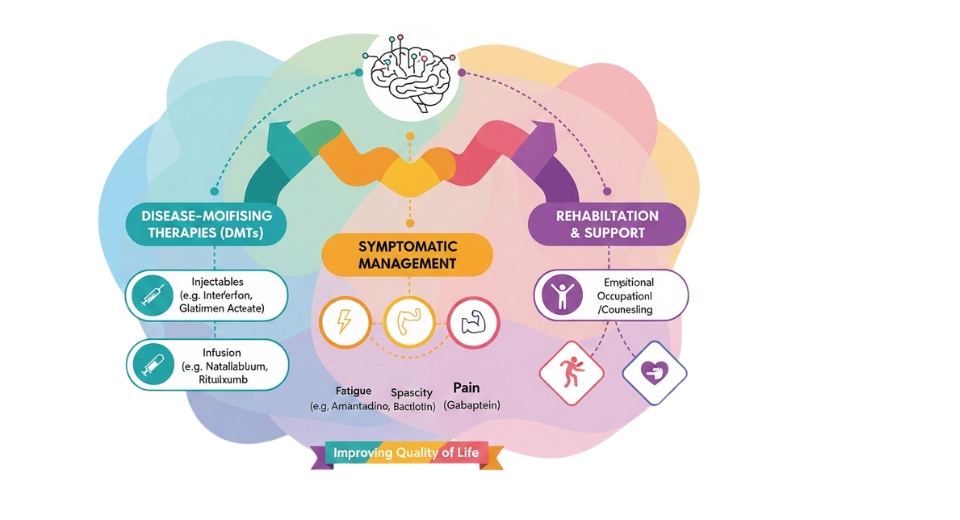
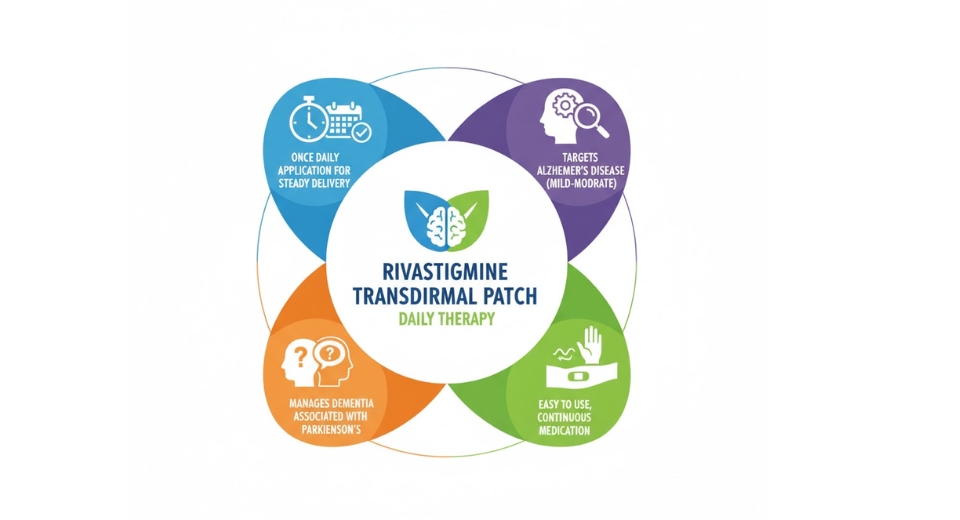
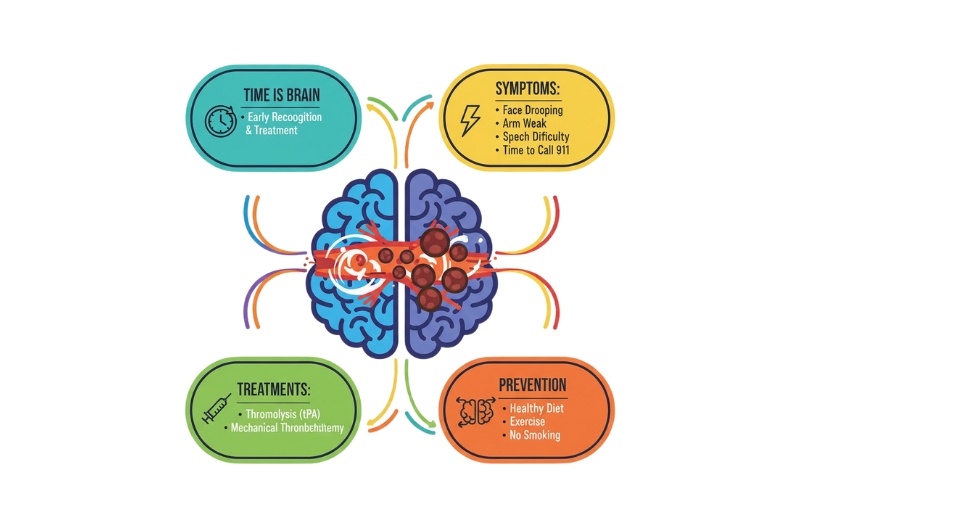
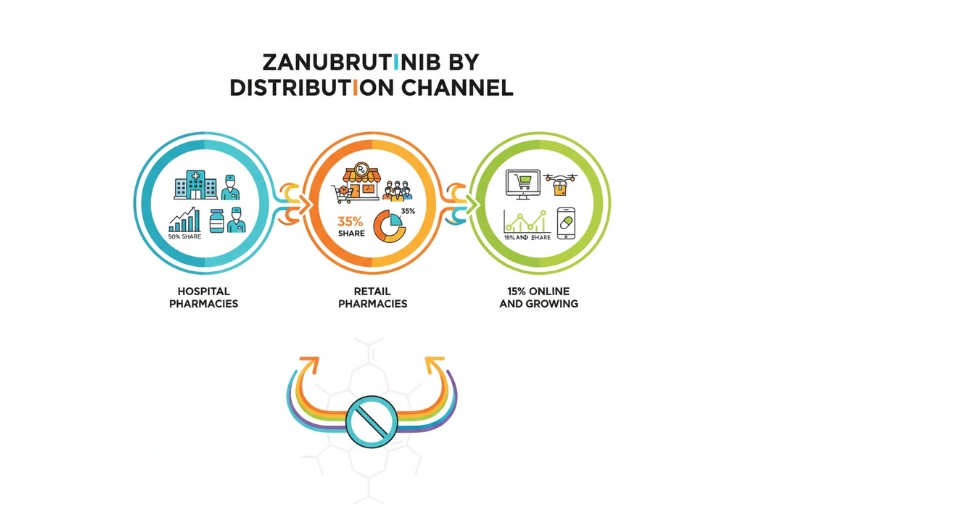

 US: +1 3023308252
US: +1 3023308252






